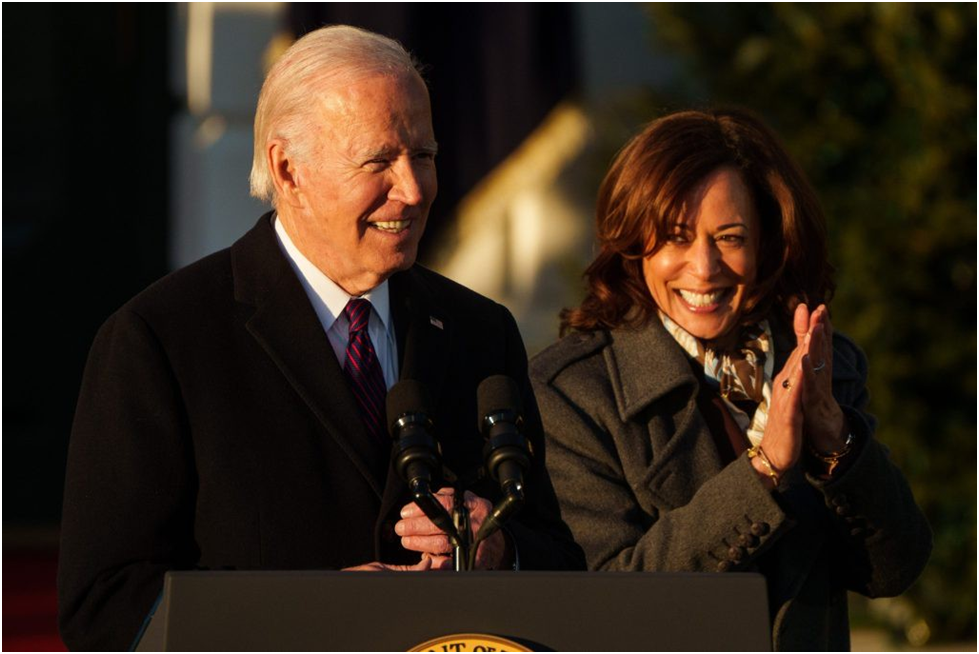

As Vice President Kamala harris mulls over her political future after the recent election defeat, President Joe Biden's resolute support for her reverberates throughout Washington, D.C.'s halls of power.
At the Democratic National Committee's holiday reception, Biden's resounding statement, "You're not going anywhere," struck a chord with guests, highlighting Harris's unwavering commitment and moral fibre in serving the country. In the midst of roiling doubts, Biden's remarks serve as evidence of the connection the two leaders have created, which goes beyond simple political ties to represent a shared dedication to unity and public service.
President Biden noted Kamala Harris's unwavering integrity and purpose in her public service career, saying, "It's also been an incredible honour to serve with someone of immense character as she demonstrated throughout her entire career." "She has always and will continue to serve this country with integrity and purpose. Biden reaffirmed, "And you're not going anywhere kid - because we're not going to let you go," signifying a deep commitment to solidarity and support despite political obstacles.
Strong Remarks for Beijing
Biden's administration is expected to send a strong message to beijing as tensions rise on the international scene, restating America's dedication to preserving democratic principles and international standards. Secretary of State stressed, "We will not waver in our efforts to hold beijing accountable for its actions that undermine global stability and human rights," in a statement highlighting the administration's position. A concerted response by Western partners to challenge Beijing's influence has been prompted by this robust attitude, which comes amid mounting concerns over China's forceful operations in the Indo-Pacific area.The entire community is alarmed by the recent diplomatic rift between beijing and Washington, with analysts predicting that tensions may escalate. A senior defence source emphasised the strategic significance of keeping a strong presence in the area by saying, "The united states must remain vigilant in the face of China's aggressive posturing and expansionist agenda." The threat of a new Cold war looms large as both countries negotiate difficult geopolitical issues, highlighting the necessity of strategic engagement and well-balanced diplomacy to prevent a catastrophic confrontation.China's Countermeasures
china has launched a number of retaliatory actions in response to mounting international pressure, with the goal of strengthening its regional control and eroding Western influence. Beijing's economic coercion strategies and cyberwarfare skills are cited by analysts as two of its most important weapons, presenting a serious threat to Western democracies. A top authority on Chinese foreign policy underlined the urgent need for coordinated action to counter Beijing's destabilising activities, saying, "China's aggressive tactics pose a direct threat to global security and stability, necessitating a unified response from the international community."
Western intelligence circles are alarmed by the recent wave of cyberattacks attributed to state-sponsored Chinese entities, and calls have been made for improved cybersecurity and information exchange to counter the escalating danger. A senior intelligence official issued a warning, emphasising the need for a comprehensive strategy to combat the changing cyber threat landscape: "China's malicious cyber activities represent a clear and present danger to our national security and economic interests." Western democracies are being put to the ultimate test in terms of their ability to adapt and remain resilient in the face of new threats as china increases its capabilities in hybrid warfare.Pacific Diplomatic Conflict
The diplomatic struggle between china and the united states for strategic dominance in the Pacific has escalated against the backdrop of a changing geopolitical environment. The strategic significance of upholding a rules-based order in the face of growing threats is highlighted by a regional expert who stated that "the Indo-Pacific region is a critical theatre for great power competition, with significant implications for global security and economic stability." Washington needs to rethink its strategy to maintain a strong presence in the area as beijing looks to increase its influence through large-scale infrastructure projects and business alliances.In the face of mounting worries about China's growing assertiveness in the South china Sea and elsewhere, the Biden administration has made it clear that it is committed to strengthening ties and collaborations with like-minded countries in the area. A senior State Department official reaffirmed, "We stand united with our allies and partners in upholding a free and open Indo-Pacific, where nations can thrive in peace and prosperity," highlighting the common principles that unite democracies in the face of authoritarian pressures. The future course of U.S.-China ties will be shaped by the forthcoming diplomatic meetings and strategic discussions, highlighting the enormous stakes involved in negotiating a challenging and unstable geopolitical environment.The long-standing alliance between President Biden and Vice President harris serves as a ray of hope for solidarity and fortitude in the face of hardship as the balance of power in the world continues to shift. The ongoing power of American leadership on the international scene is demonstrated by their persistent determination to maintaining democratic values and their common commitment to public service. The opportunities and challenges that lie ahead will put leaders' and nations' resolve to the test, highlighting the necessity of cooperation and unity in tackling the intricate problems of the twenty-first century.




 click and follow Indiaherald WhatsApp channel
click and follow Indiaherald WhatsApp channel